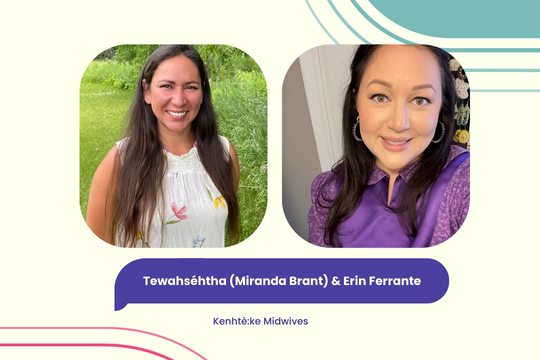In this section :
The 2025 theme for Canadian Patient Safety Week, All Voices for Safer Care, reminds us that building safer healthcare systems isn’t the responsibility of one person or one role — it’s something we create together, by supporting every role and building trust across the system.
Throughout this blog series, we’re sharing the stories of champions from across Canada who are helping redefine what safer care means today: from point of care to leadership, from lived experience to learning systems.
Their insights show how building safer systems, supporting all roles, and listening with curiosity are essential steps toward safer, more equitable care for everyone.
Kenhtè:ke Midwives is a primary healthcare provider providing culturally-appropriate maternal and newborn care to Indigenous families living on the Tyendinaga Mohawk Territory and surrounding areas of southeastern Ontario including Kingston, Napanee, Belleville and Trenton. Tewahséhtha (Miranda Brant) is a Midwife and Erin Ferrant is Administrative Lead.
Kenhtè:ke Midwives serves all interested First Nations, Inuit and Métis families on Tyendinaga Mohawk Territory and surrounding areas, providing full-scope midwifery care grounded in cultural traditions and community connection. Recognizing that birth is a deeply vulnerable time, Kenhtè:ke Midwives works to protect clients from physical, emotional, and cultural harm by fostering trust, honouring traditions, and supporting individual needs. Through strong relationships and open communication, Kenhtè:ke Midwives ensures that every birth is safe, respectful, and centred on the whole person.
Tell us a bit about Kenhtè:ke Midwives and the community you work with.
We provide full scope midwifery care to anybody who identifies as First Nation, Inuit or Métis, whether it’s the mother, the father, or both. We do home births as well as clinic and hospital births – wherever the client feels safest.
Beyond midwifery, we are active in the community through programs and workshops that help people connect with our traditions and cultures, so they know we are a safe resource for every stage of life.
Tyendinaga is one of the largest Mohawk territories in Ontario, and we also serve a large off-territory community that lives within a three-hour radius of Tyendinaga.
What does safe care mean to you?
To our midwifery practice, safe care means ensuring every client is supported at all times, with attention to their physical, emotional and cultural needs – a whole-person approach where the client feels heard and understood. Our midwives feel a strong responsibility to protect clients, especially during hospital births off-territory, where unfamiliar environments and Western medical practices can add stress and create harm.
How has your understanding of safety evolved over time?
Advocating for the safety of our clients is a constant responsibility – it never truly ends, and it requires clear, ongoing communication at every level of care. Our work with the two closest hospitals to our territory is a good example. We’ve advocated really hard to be recognized as primary healthcare providers for our clients to ensure we are able to stay with our clients through their births, so that individual and cultural needs can be honoured.
For example, bringing home the placenta is a deeply important cultural practice for our people – and it is every patient’s right. Even a small breakdown in communication between care teams can result in that right being overlooked, which causes real harm. From upper management to floor staff, regular, respectful communication with hospital teams is essential to protecting clients from all forms of harm.
Can you share something you or your team has done that made care safer?
We have a memorandum of understanding in place with the two hospitals closest to our territory. These agreements formally recognize our midwives as healthcare providers, which means they can stay with clients at all times and ensure care addresses the whole person – not just the medical situation.
That recognition makes a real difference. Recently, a client’s baby was born prematurely. Because the mother’s midwife was able to stay by her side the entire time, she could advocate for immediate skin-to-skin contact before the baby went to the NICU because she knew the baby was safe and healthy enough to do so in that moment.
Even with these agreements in place, it can be a challenge to have hospital staff consistently recognize midwives’ role and authority, which is why we continue to prioritize strong, ongoing communication with our hospital partners.
What’s one action people in roles like yours can take to support a culture of safety?
Just talk! Talk and be open to looking at someone as a whole person, not just an individual with a specific health problem or need. The reason that brings someone into the hospital is not their whole story. They have a whole history, a whole story, a whole life outside of this one moment. You are now a part of their story. So, what is the impact you’re going to leave on them? How can you make their life better, and yours too?
“For many people, giving birth is one of the most powerful days of their life – a moment when they remember exactly who stood beside them. How do we make that moment better for them? What does the mother truly need? These are simple questions, but ones that too often go unasked.”
Safe and respectful First Nations, Inuit and Métis maternal and newborn care
Learn more about the experiences of First Nations, Inuit and Métis and ways to provide safer maternal and newborn care.
